Greetings, people of Earth. This is the beginning of a regular column wherein I will discuss the history/evolution behind various costumes and designs in superhero comics and other fun media. I’ll also be throwing in my own opinions, which you can take or leave since we all have different tastes. To kick things off, I thought it would be fun to talk about a lady first introduced in 1941: Wonder Woman AKA Diana Prince AKA Princess Diana of Themyscira, the Paradise Island. We now know for sure that Gal Gadot will be playing her in the as-yet-untitled sequel to Man of Steel that really seems like it should be titled Hey, We’re Almost the Justice League.
There’s a lot of debate going on about how Wonder Woman should be portrayed. So to add food for thought, this column looks at how the amazing Amazon has been portrayed in live-action shows, with a couple of honorable mentions from comics and animation.
And before you ask, I will be focusing on officially licensed stories.
EARLY ATTEMPTS
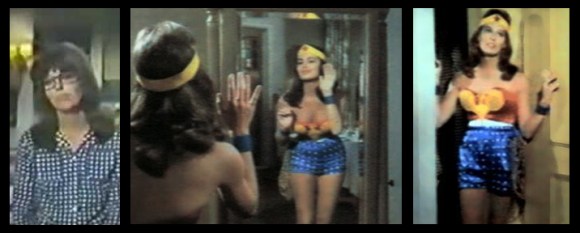
In 1967, a pilot was partially filmed called “Who’s Afraid of Diana Prince?” The idea was to mimic the success of the Batman TV show starring Adam West. But while Batman was the hero of his funny series, this pilot made Diana the joke.
Played by Ellie Wood Walker, Diana Prince was blessed with powers from the Greek gods. However, as the pilot’s narrator pointed out, she was also under the delusion that she became beautiful when she donned her Wonder Woman costume, seeing Linda Harrison (Planet of the Apes) in the mirror. Not kidding. The costume was faithful but a bad fit, apparently intended to further how awkward and silly she seemed.
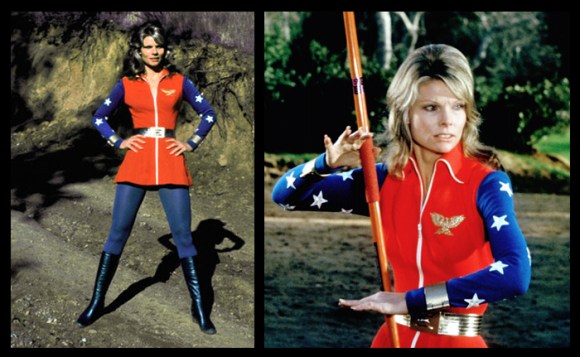
In 1974, Cathy Lee Crosby starred as the title hero of a made-for-TV Wonder Woman movie for ABC. The costume designer was Jerry Herrin, also known for work on The Bionic Woman, the Dr. Strange TV-movie and Blade Runner). From 1968-1973, the comics had depicted Diana as a powerless martial artist who had no secret identity and acted as an international troubleshooter. This TV-movie followed a similar model, making Diana Prince personal assistant to government agent Steve Trevor, who in turn sometimes sent her into the field as an operative (as often happens with personal assistants).
Though apparently born an Amazon, she was an athletic woman who relied on tech rather than magic or powers. She owned a collection of bracelets that all had different functions (homing devices, time bombs, etc.). Rather than a lasso, her belt buckle held a rope that could hook onto one of her bracelets and become a grapple line. The outfit looks like a USO performer rather than a government operative, but it’s not bad and reflects the TV-movie version of Diana pretty well.
THE NEW, ORIGINAL WONDER WOMAN

In 1975, ABC decided to make a Wonder Woman TV show that adapted the original comics by creator William Moulton Marston. To celebrate this adaptation and distinguish the series pilot from the TV-movie starring Cathy Lee Crosby, it was hilariously entitled The New, Original Wonder Woman.
The series starred 24-year-old Lynda Carter, a Miss World USA winner who was facing eviction almost ready to call it quits on acting when she was hired to play the amazing Amazon. The TV program had Donfeld as the costume designer, with Jerry Herrin later joining. Donfeld later worked on films such as Spaceballs.
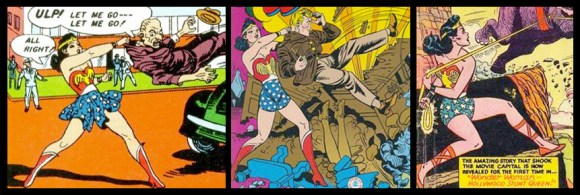
This is a pretty straightforward adaptation of the Golden Age Wonder Woman outfit but with the Silver Age style shorts. If you’re not familiar, the Golden Age of comics generally refers to the period of the mid 1930s to the early 1950s, while the Silver Age began in 1956.
The Golden Age version of Wonder Woman wore a skort initially (sometimes drawn as a skirt) and then had athletic shorts that covered her thighs a bit. In the 1950s, her shorts got much shorter, freeing her legs entirely. Staring in the 1990s, her shorts occasionally resembled Brazilian cut bikini bottoms or a straight up thong, depending on the artist.
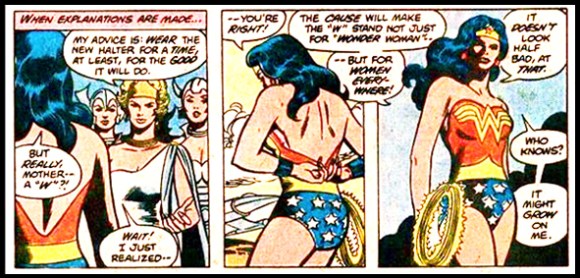
Along with this, Carter is rocking out the classic version of Diana’s eagle crest. Wonder Woman wore many versions of a golden eagle crest on her top until 1982. At that point, her mom decided it would be better for marketing if she had a stylized WW that only looked like an eagle if you squinted at it and had a drink or two in you. Ok, that’s not exactly what happened, but it’s still basically the truth.
It’s a fun costume and absolutely fits the atmosphere of the program. This was a Wonder Woman who fought Nazis in the 1940s with a smile, whose scenes embraced a level of absurdity and were introduced with comic book style captions appearing on the screen. Lynda Carter also added a lot by making the decision to act as natural as possible while in costume, believing that Wonder Woman would not act overly dramatic or feel self-conscious about the uniform she wore.
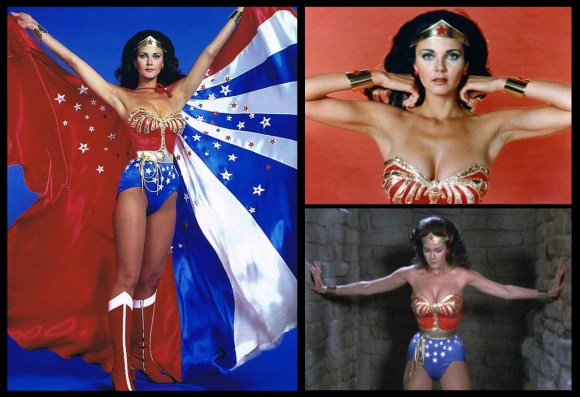
Because of the budget concerns that come with producing a period piece, ABC hesitated on picking up Wonder Woman for a second season. Seeing the show’s good ratings, CBS made an offer and took over the show starting with season 2. CBS continued the continuity of the ABC season but made a few changes. Season 2 jumped ahead in time to the present day. Diana had gone back to her island for decades after the events of World War II, her aging process slowed by its magic.
The New Adventures of Wonder Woman (as it was retitled) changed the costume’s eagle design and switched the classic silver bracelets for golden ones. The cut of the outfit was altered for a tighter fit that now revealed more skin. Likewise, Wonder Woman’s alter ego Diana Prince no longer dressed down to disguise her beauty.
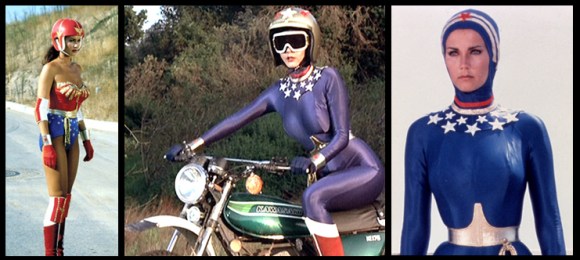
CBS ran the series to two seasons before canceling it. During this time, Wonder Woman occasionally sported specialty outfits, such as a motorcycle bodysuit and a skateboard look for that one time she had to use a skateboard. Years later, the Lynda Carter outfits made their ways into comics thanks to writer/artist Phil Jimenez.
Lynda Carter’s performance was a huge influence on fans and creators. She is also responsible for the idea that Wonder Woman can magically change outfits by spinning (previously, comics had her sometimes use her lasso to alter her garments). I don’t care what any of you say, I love that spin.
THOUGHTS ON DESIGN
In several interviews, Lynda Carter has said she was somewhat uncomfortable with altering the Wonder Woman costume in the second season and with the show producing certain posters of her simply to increase sex appeal. In a 1979 interview with US Magazine, she said: “I never meant to be a sexual object for anyone but my husband. I never thought a picture of my body would be tacked up in men’s bathrooms.”
Next to Lynda Carter, the most influential person to play Wonder Woman for TV viewers has been Susan Eisenberg, who voiced the role for five years in the cartoon Justice League, which became Justice League Unlimited. She’s also voiced it for other animated features, DC Nation shorts, and video games such as Injustice: Gods Among Us and DC Universe Online.
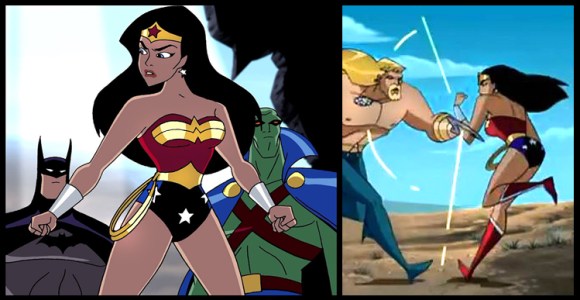
Concerning the Diana’s costume, Eisenberg told me: “I was always written as a Princess – a Lady, if you will – and that made all the difference! Like with Wonder Woman portrayed by Linda Carter, the sexiness was draped in an elegance . . . Our Wonder Women were never driven strictly by their sex appeal or toughness . . . they were also courageous, empathic, strong, virtuous women.”
On another topic, there has been criticism about Wonder Woman’s outfit still being such an obvious patriotic product of the 1940s. The 1987 reboot of Wonder Woman said that her costume honored the uniform and insignia of a US pilot who saved the Amazons. Gail Simone‘s Wonder Woman comics indicated that Amazon culture always had eagles, red and white stripes, and star-spangled banners, and that these designs inspired Betsy Ross rather than vice versa.
Personally, I say it would be fun to borrow a page from Carter’s second season. Just say that yes, Wonder Woman fought in World War II, a hero who some believed was an urban myth. Then decades later, she comes back after the debut of Superman. Let her be proud of her costume rather than trying to convince us it isn’t based on an American flag. It worked for Captain America and many other characters. Just my two cents.
LIVE-ACTION TELEVISION
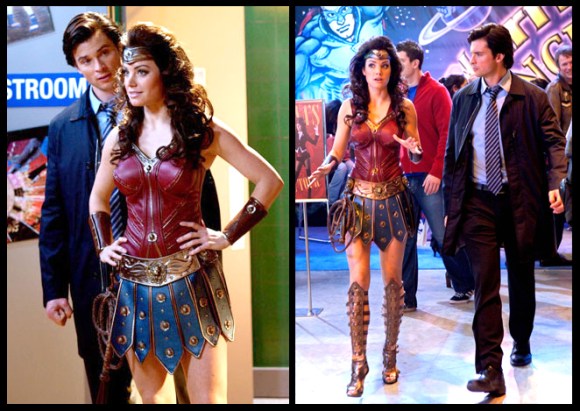
Erica Durance played Lois Lane in the CW show Smallville, based on the early adventures of Clark Kent before he became Superman. In the 2010 episode “Warrior,” Lois sported a very familiar outfit while attending Metropolis WonderCon.
I don’t think Wonder Woman should look too much like a throwback to ancient Greek or Roman times because she’s the one Amazon (traditionally) who wasn’t born and raised in the past. She has roots in the past, but she’s a modern hero who wants to help her people and the world find a brighter future. That said, this is a great outfit and Erica Durance pulled it off well.
In 2011, David E. Kelley (Ally McBeal) spearheaded a pilot for a new Wonder Woman series starring Adrianne Palicki. It was a great choice, as Palicki has the height, look and presence for the role, plus she’s someone who can do stunt work. Along with Palicki, the pilot had an impressive cast that included Tracie Thoms, Cary Elwes and Elizabeth Hurley. But despite initial plans and promotional materials indicating it was already going to series, production for a series was cancelled at the last minute and the pilot wasn’t completed. Some have claimed this was due to internal politics.
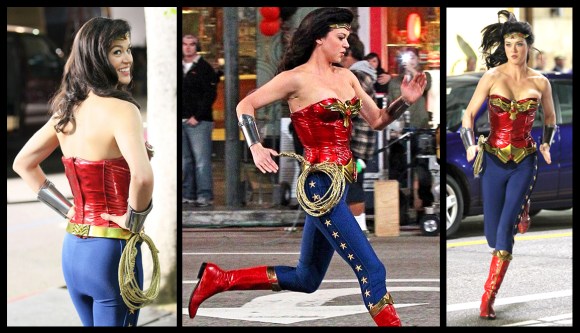
I think the design for Palicki’s main uniform isn’t bad and works with the pilot’s idea that Diana had marketing design outfits to garner good will and support from the public. This look is in keeping with the aesthetic of the current live-action films and TV programming featuring DC Comics characters. But I’d definitely alter things such as the size/shape of the tiara, so it could be partly protective. Maybe lose the star on the eagle crest while also tweaking the shape and fit (superheroes should be comfortable).
I don’t think the material of the top and the boots is the best. If this show intended to have the atmosphere of Lynda Carter’s series, it would be fine. But for a more serious take, something akin to red leather would have a better visual impact. The one thing I definitely don’t like at all is the distracting belt buckle.
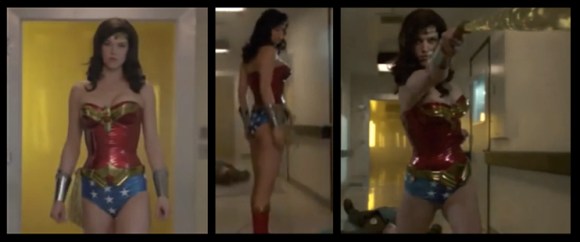
For the climatic battle scene, Palicki’s Wonder Woman exchanged the trousers for more traditional Wonder Woman shorts. Again, the design isn’t bad, I just think the choice of materials isn’t great, not for the atmosphere of the show.
In 2012, Erica Durance wore Palicki’s Wonder Woman costume on an episode of David E. Kelley’s show Harry’s Law, entitled “Gorilla of My Dreams.” She wasn’t a superhero, just a normal woman inspired by the heroic comic book character.
POST NEW 52
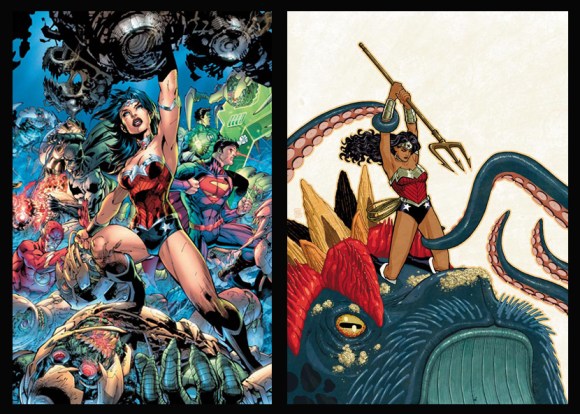
Now, we’ve been focusing on what’s appeared on television, but we should mention how the comics have changed recently and how that’s likely to influence upcoming adaptations. Following the crossover story Flashpoint in 2011, DC rebooted its superhero universe and released 52 new comic titles. In the “New 52” universe, Diana wears silver rather than gold. For Wonder Woman, I prefer gold. Not only because it’s what’s familiar (though there is that bias), but because I think she looks a little too cold when she’s got so much silver on her.
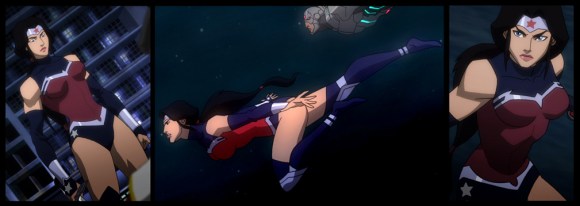
Coming in February, we’ll see another animated Diana in the DVD-movie Justice League: War (and you can find me in the special features). This is an adaptation of the Justice League “Origin” story that introduced the New 52 version of the superhero team. But this version of Diana, played by Michelle Monaghan, wears her own version of the costume.
I’m not entirely sure about this outfit. Having the top reach up to Diana’s neck is a nice change from what we usually expect, but the eagle doesn’t look particularly proud or impressive to me. Maybe it were larger. It’s also odd to me that Diana would wear arm warmers beneath her bracelets.
COSTUMES TO NOTICE
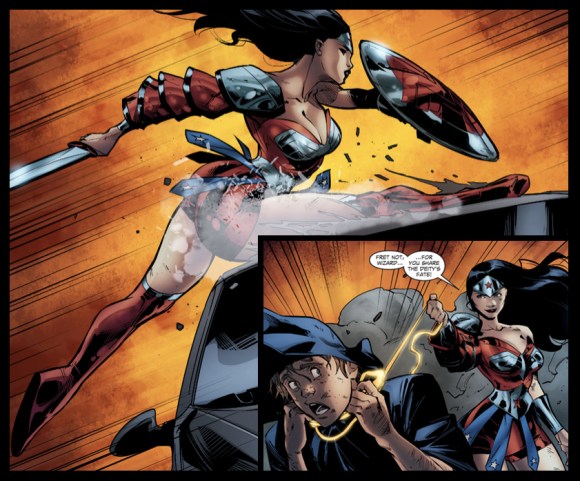
Before we go, I want to mention two outfits recently seen that I think could look great if translated to live-action media. That “Warrior” episode of Smallville was written by Bryan Q. Miller, who now writes the Smallville Season 11 comics. In the recent storyline “Olympus,” a new version of Wonder Woman debuted, designed by Miller and artist Jorge Jimenez. The story was colored by Carrie Strachan.
This design is a great balance between superhero costume and warrior armor. Protecting the arm that isn’t carrying the shield is a nice touch. I generally think it’s questionable for characters that fly to also wear skirts, but having shorts underneath solves that potentially awkward situation. Great boots, too.
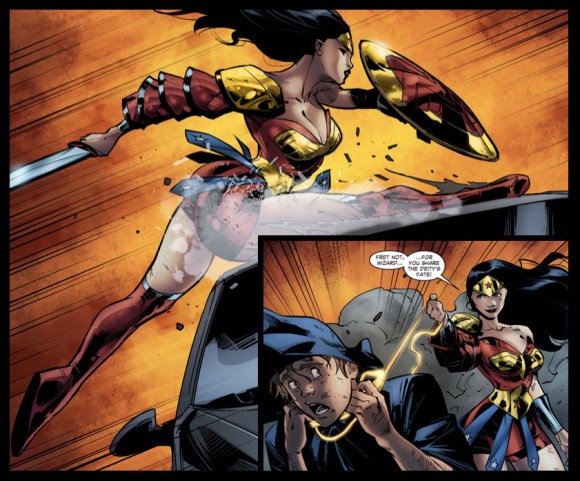
Of course, I still prefer Diana in gold as opposed to so much silver. So for fun, I did some photoshop alteration just to see how the outfit would look otherwise. You’re free to disagree, but I definitely dig this. It just pops more to my eyes. Diana’s a very warm character and I think gold reflects that better. In any event, I recommend “Olympus” to readers, especially if you have an urge to see adorable 6-year-old Diana. You don’t need to know the Smallville show to enjoy.
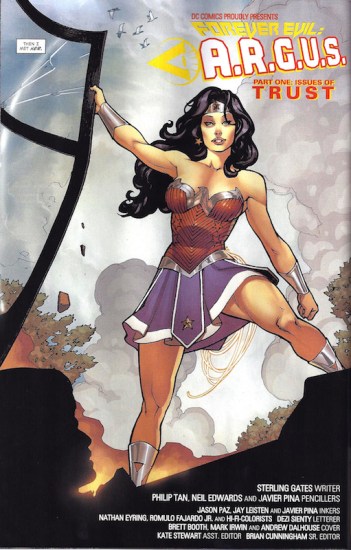
Another recent take on Wonder Woman was drawn by Javier Pina in a flashback scene in Forever Evil: Argus, written by Sterling Gates. The scene reveals how Diana and pilot Steve Trevor met in the New 52 universe, before she came to the outside world and helped found the Justice League.
This flashback costume is great. I love the skirt mixing stylized superhero cloth and warrior leather. Making the boots match the silver bracelets is a really cool touch, the design harkening back to the laces she wore in the 50s.
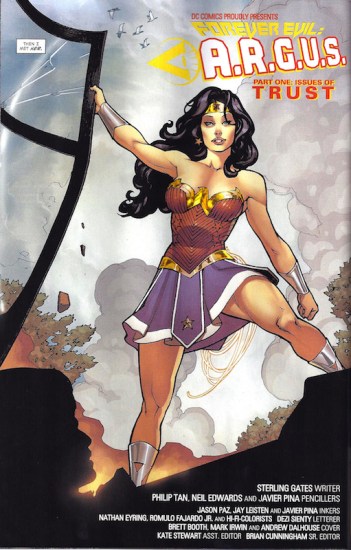
Yet I still prefer gold on Wonder Woman, so just for fun, here’s another photoshop manipulation (though I left the boots silvers because I really do dig how they balance out the bracelets). I prefer this coloring, but even in silver this is a great design and I wouldn’t mind if it became Diana’s mainstream outfit. I think it would also translate well to a fun live-action film.
Folks, that wraps it all up for now. Comment with suggestions on who else you want to see tackled in this column! This is Alan Kistler, signing off.
Alan Sizzler Kistler (@SizzlerKistler) is an actor and freelance writer. He is the author of Doctor Who: A History.



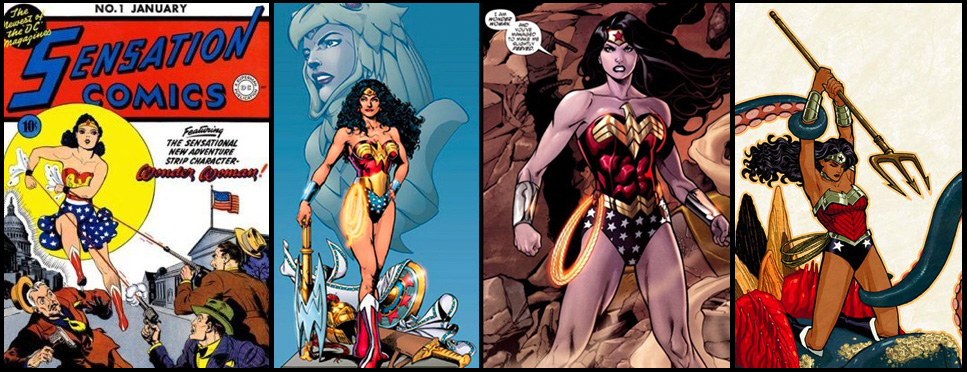





Published: Dec 19, 2013 12:38 pm